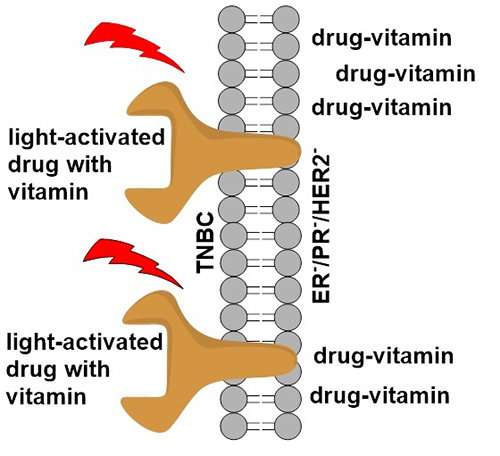New drug technology may improve treatment options for aggressive types of breast cancer

Purdue University researchers have developed a new technology that may change how one of the most aggressive types of breast cancer is treated.
More than 200,000 cases of breast cancer are diagnosed each year in the United States. The most aggressive type of breast cancer, known as triple negative breast cancer (TNBC), disproportionately affects young premenopausal women of African-American or Hispanic descent.
Chemotherapy remains the only treatment for TNBC, but chemotherapy does not specifically target cancer cells and causes debilitating side effects. A new, targeted therapy is needed to treat TNBC without adverse effects.
"TNBC is a very aggressive type of breast cancer with a short survival rate due to lack of available therapeutic drugs used for treatment that will cause minimal side effects," said Meden Isaac-Lam, an associate professor in the Department of Chemistry and Physics at Purdue University Northwest, who led the research team. "There are no known recognized molecular targets for TNBC, making the design of highly specific drugs extremely challenging."
Isaac-Lam's team developed new drug candidates that are potent at lower concentrations than chemotherapy. The technology employs molecules that are selectively taken up by cancer cells and activated by light.
"Our proposed solution is to design drugs that target vitamin receptors produced excessively in cancer cells, which compete with normal cells for the vitamins necessary for cellular growth and proliferation," Isaac-Lam said. "Attaching vitamins on compounds that are light-activated and that are known to be taken up by tumor cells will provide a means of selectively accumulating these synthetic drug-vitamin conjugates in cancer cells more than in healthy cells."
The compounds are injected into the patient and accumulate in the cancer cells, which are killed when struck by light.
This targeted therapy promises to reduce the dosage of drug needed to treat TNBC and effectively reduce side effects.
"This will be an alternative solution to the available therapies that are not selective to the tumor cells causing detrimental effects to the patient's healthy cells," Isaac-Lam said. "The technology can be an effective treatment for breast cancer patients who are not responding to the standard conventional therapy."
The new drug candidates may also prove effective in treatments for other types of breast cancer.
















